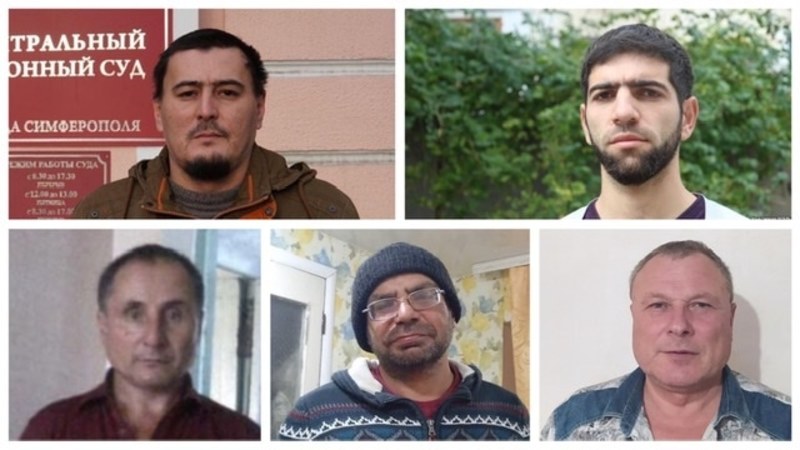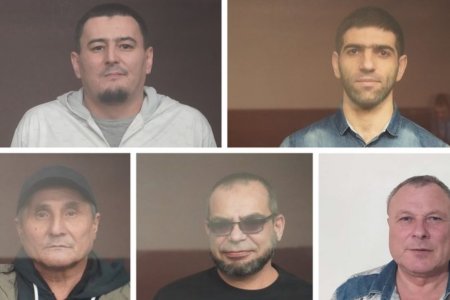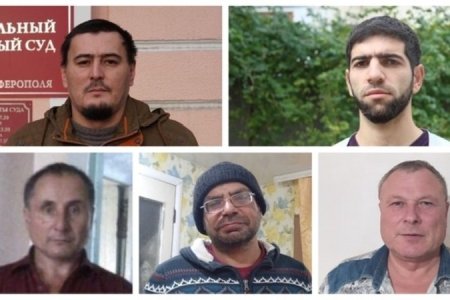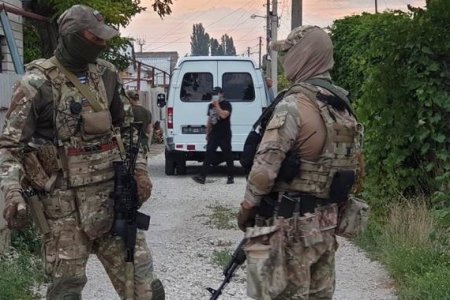
A Russian prosecutor has demanded sentences of 11 to 17 years against five Crimean Tatars arrested in August 2022, just after Ukraine’s Armed Forces launched a humiliating attack on a Russian military airbase in occupied Crimea. Such reprisals should come as no surprise when Russia is currently quite openly bombing Ukrainian residential buildings and killing children in retaliation for Ukraine’s 1 June drone attack on legitimate Russian military targets. There was, however, a difference in 2022 since Russia was denying that the huge explosions at a Crimean military base that destroyed up to nine of its warplanes were caused by an attack.
Russia has been fabricating surreal ‘terrorism’ charges against Crimean Tatar civic journalists and activists since soon after its invasion of Crimea, and it is quite likely that Crimean Solidarity civic journalist, Vilen Temerianov, and civic activist Enver Krosh would have been targeted at some point. The main ‘evidence’ in this case was, however, an illicitly taped conversation about religious faith and daily prayers from 2015. Prominent human rights lawyer Emil Kurbedinov was not alone in believing that the FSB had pulled out the recording after seven years and set about fabricating the charges in order to claim that “a terrorist cell controlled from Ukraine had been eliminated.” This was, he said, a narrative dictated by the events since February 2022 (i.e. Russia’s full-scale invasion of Ukraine.
If that was the case, then what better time to stage another such ‘operation’ when these events are not going to plan? The armed ‘searches’ and arrests on 11 August 2022 of Crimean Solidarity civic journalist Vilen Temerianov (b. 1985) Seitiaha Abbozov (b. 1957); Rinat Aliev (b. 1964); Edem Bekirov (b. 1976); Enver Krosh (b. 1991); and Murat Mustafayev (27 at the time) were staged with particular lawlessness. Russia’s FSB always illegally prevent lawyers from being present during the so-called ‘searches’, where officers standardly plant ‘prohibited literature’. On 11 August 2022, they went one step further and cut off the lawyers’ mobile telephone connection, and also aggressively threatened civic journalists and activists from the Crimean Solidarity human rights movement who arrived in order to ensure publicity. It should be stressed that there is every reason to take such threats seriously as Temerianov was the latest of very many journalists targeted for having refused to remain silent about Russian repression in occupied Crimea.
Russia’s excuse for arresting men who were not accused of any actual crime was a secret and probably politically motivated Russian supreme court ruling from 2003. That declared the peaceful, if controversial, transnational Muslim organization Hizb ut-Tahrir, which is legal in Ukraine, to be a ‘terrorist’ organization, without providing any explanation. The alleged ‘proof’ of involvement in Hizb ut-Tahrir was claimed to lie in a taped conversation, which the FSB had had in their possession for seven years, and which nowhere mentions Hizb ut-Tahrir. That and so-called ‘secret witnesses’ whose identity is concealed and who may not even know the men. And in the ‘prohibited religious literature’ which the FSB claimed to have ‘found’ after preventing lawyers from being present at their armed ‘searches’ and witnessing them plant it.
In this case, civic activist Enver Krosh (b. 1991) has been designated as the supposed ‘organizer’ of an unproven Hizb ut-Tahrir group under Article 205.5 § 1 of Russia’s criminal code. Crimean Solidarity civic journalist Vilen Temerianov (b. 1985); Seitiaha Abbozov (b. 1957); Rinat Aliev (b. 1964); Edem Bekirov (b. 1976) are accused of ‘involvement’ in this supposed group, under Article 205.5 § 2. In occupied Crimea, Russia also adds an extra, preposterous, charge of ‘planning to violently seize power’, under Article 278.
This case differed from others in one other way, namely the fact that the sixth Crimean Tatar, Murat Mustafayev, was ‘tried’ separately, a mere 8 months after his arrest and sentenced to four years, the shortest sentence by many years on Hizb ut-Tahrir charges against Ukrainian citizens in occupied Crimea. It is impossible to know what methods were applied to get Mustafayev to ‘admit guilt’, but it is, unfortunately, likely that more was demanded of him in return for the lower sentence.
Although ‘guilty’ verdicts and long sentences are essentially predetermined, the other men and their lawyers have repeatedly demonstrated how flawed the charges are and how falsified the evidence. This includes the ‘secret witnesses’, one of whom ‘could not remember’ anything except the indictment and also claimed that Villen Temerianov had “always taken part’ in supposed meetings of a Hizb ut-Tahrir group in 2015. The latter was demonstrably false as Temerianov had spent long periods outside occupied Crimea seeking vital medical treatment for his child. ‘Judges’ are complicit in such travesties, invariably allowing men to ‘testify’ in secret and blocking questions which prove that their testimony is false.
Independent analysts had confirmed that the books, allegedly found in the men’s homes, contained several fingerprints, but not the defendants’. The men and their lawyers asked for all supposed material evidence to be sent for an independent check. This was, typically, rejected by presiding ‘judge’ Timur Mashukov from the Southern District Military Court. He also refused to add the independent analysis to the case material. Neither the lawyers, nor the men themselves, were given an opportunity to see material sent by the court for assessment.
The Russian prosecutor has now demanded horrific sentences of maximum-security (‘harsh-regime’) imprisonment), with the first four years in a prison, the harshest of Russia’s penal institutions, with extreme restrictions. He asked for the following sentences: Enver Krosh (b. 1991) – 17 years; Edem Bekirov (b. 19760 and Rinat Aliev (b. 1964);) – 15 years; Vilen Temerianov (b. 1985) – 13 years; Seitiaha Abbozov (b. 1957). The last of these terms, if handed down by ‘judge’ Timur Mashukov and two colleagues, would certainly be a death sentence, as Abbozov is one of only three or four political prisoners whose state of health has meant that even the FSB asked only for them to be held under house arrest, and not in detention, before the trial. There are no grounds for suspecting the FSB of humanitarian motives – they have only ever wanted to ensure that the men did not die before the convictions.



